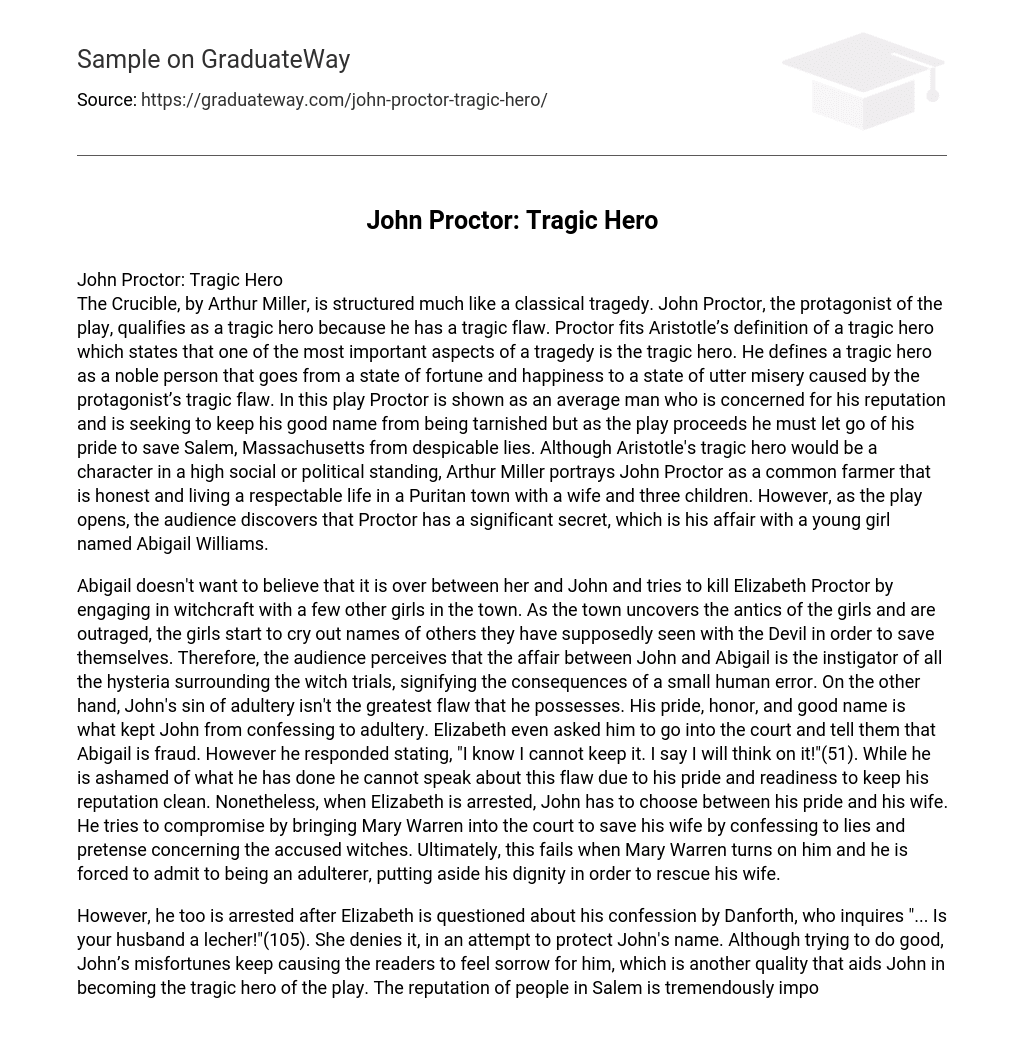The Crucible, by Arthur Miller, is structured much like a classical tragedy. John Proctor, the protagonist of the play, qualifies as a tragic hero because he has a tragic flaw. Proctor fits Aristotle’s definition of a tragic hero, which states that one of the most important aspects of a tragedy is the tragic hero. He defines a tragic hero as a noble person that goes from a state of fortune and happiness to a state of utter misery caused by the protagonist’s tragic flaw. In this play Proctor is shown as an average man who is concerned for his reputation and is seeking to keep his good name from being tarnished but as the play proceeds he must let go of his pride to save Salem, Massachusetts from despicable lies. Although Aristotle’s tragic hero would be a character in a high social or political standing, Arthur Miller portrays John Proctor as a common farmer that is honest and living a respectable life in a Puritan town with a wife and three children. However, as the play opens, the audience discovers that Proctor has a significant secret, which is his affair with a young girl named Abigail Williams.
Abigail doesn’t want to believe that it is over between her and John and tries to kill Elizabeth Proctor by engaging in witchcraft with a few other girls in the town. As the town uncovers the antics of the girls and are outraged, the girls start to cry out the names of others, they have supposedly seen with the Devil in order to save themselves. Therefore, the audience perceives that the affair between John and Abigail is the instigator of all the hysteria surrounding the witch trials, signifying the consequences of a small human error. On the other hand, John’s sin of adultery isn’t the greatest flaw that he possesses. His pride, honor, and good name are what kept John from confessing to adultery. Elizabeth even asked him to go into the court and tell them that Abigail is a fraud.
However, he responded stating, “I know I cannot keep it. I say I will think about it!”(51). While he is ashamed of what he has done, he cannot speak about this flaw due to his pride and readiness to keep his reputation clean. Nonetheless, when Elizabeth is arrested, John has to choose between his pride and his wife. He tries to compromise by bringing Mary Warren into the court to save his wife by confessing to lies and pretense concerning the accused witches. Ultimately, this fails when Mary Warren turns on him and he is forced to admit to being an adulterer, putting aside his dignity in order to rescue his wife.
However, he too is arrested after Elizabeth is questioned about his confession by Danforth, who inquires “… Is your husband a lecher!”(105). She denies it, in an attempt to protect John’s name. Although trying to do good, John’s misfortunes keep causing the readers to feel sorrow for him, which is another quality that aids John in becoming the tragic hero of the play. The reputation of people in Salem is tremendously important. John Proctor is a key in showing this theme by being characterized as the tragic hero as he breaks down the walls of his pride to save Salem from crumbling beneath lies. Although he is honest and is portrayed as someone who may seem greater than the average human, his flaw allows him to be well understood by the readers.





